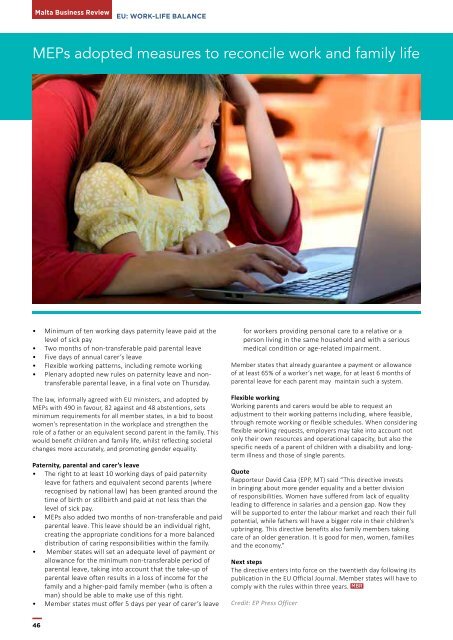MBR_ISSUE 50_APRL_lowres
Create successful ePaper yourself
Turn your PDF publications into a flip-book with our unique Google optimized e-Paper software.
Malta Business Review<br />
EU: WORK-LIFE BALANCE<br />
MEPs adopted measures to reconcile work and family life<br />
• Minimum of ten working days paternity leave paid at the<br />
level of sick pay<br />
• Two months of non-transferable paid parental leave<br />
• Five days of annual carer’s leave<br />
• Flexible working patterns, including remote working<br />
• Plenary adopted new rules on paternity leave and nontransferable<br />
parental leave, in a final vote on Thursday.<br />
The law, informally agreed with EU ministers, and adopted by<br />
MEPs with 490 in favour, 82 against and 48 abstentions, sets<br />
minimum requirements for all member states, in a bid to boost<br />
women’s representation in the workplace and strengthen the<br />
role of a father or an equivalent second parent in the family. This<br />
would benefit children and family life, whilst reflecting societal<br />
changes more accurately, and promoting gender equality.<br />
Paternity, parental and carer’s leave<br />
• The right to at least 10 working days of paid paternity<br />
leave for fathers and equivalent second parents (where<br />
recognised by national law) has been granted around the<br />
time of birth or stillbirth and paid at not less than the<br />
level of sick pay.<br />
• MEPs also added two months of non-transferable and paid<br />
parental leave. This leave should be an individual right,<br />
creating the appropriate conditions for a more balanced<br />
distribution of caring responsibilities within the family.<br />
• Member states will set an adequate level of payment or<br />
allowance for the minimum non-transferable period of<br />
parental leave, taking into account that the take-up of<br />
parental leave often results in a loss of income for the<br />
family and a higher-paid family member (who is often a<br />
man) should be able to make use of this right.<br />
• Member states must offer 5 days per year of carer’s leave<br />
for workers providing personal care to a relative or a<br />
person living in the same household and with a serious<br />
medical condition or age-related impairment.<br />
Member states that already guarantee a payment or allowance<br />
of at least 65% of a worker’s net wage, for at least 6 months of<br />
parental leave for each parent may maintain such a system.<br />
Flexible working<br />
Working parents and carers would be able to request an<br />
adjustment to their working patterns including, where feasible,<br />
through remote working or flexible schedules. When considering<br />
flexible working requests, employers may take into account not<br />
only their own resources and operational capacity, but also the<br />
specific needs of a parent of children with a disability and longterm<br />
illness and those of single parents.<br />
Quote<br />
Rapporteur David Casa (EPP, MT) said “This directive invests<br />
in bringing about more gender equality and a better division<br />
of responsibilities. Women have suffered from lack of equality<br />
leading to difference in salaries and a pension gap. Now they<br />
will be supported to enter the labour market and reach their full<br />
potential, while fathers will have a bigger role in their children’s<br />
upbringing. This directive benefits also family members taking<br />
care of an older generation. It is good for men, women, families<br />
and the economy.”<br />
Next steps<br />
The directive enters into force on the twentieth day following its<br />
publication in the EU Official Journal. Member states will have to<br />
comply with the rules within three years. <strong>MBR</strong><br />
Credit: EP Press Officer<br />
46
















